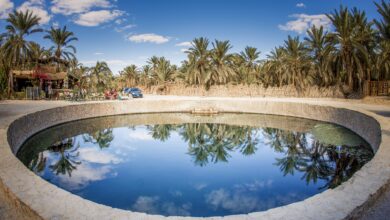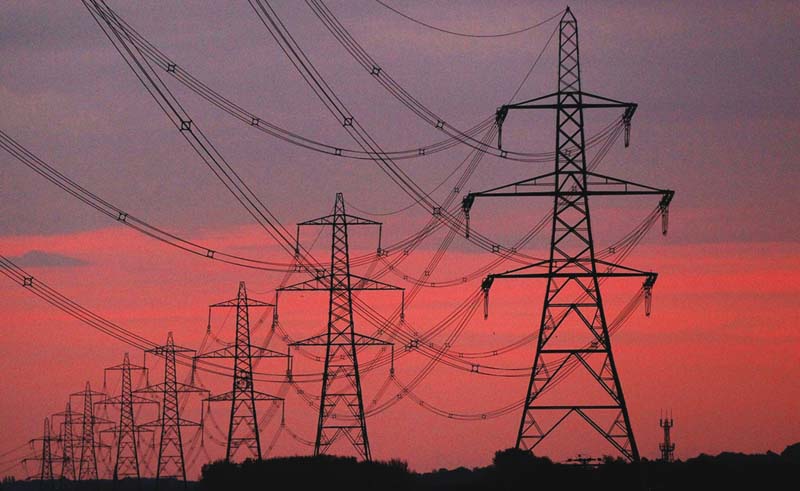After a year of dispute between businessmen and scientists, the Dabaa strip, along the Mediterranean coast, stands out as the most likely location for construction of Egypt's first nuclear plants, say political experts.
“It seems that the matter will be resolved and Dabaa will be the site,” said Mohamed Abdel Salam, an expert on nuclear energy with al-Ahram Center for Political and Strategic Studies. “This decision will be a big achievement for Egypt because it will save time and allow construction to start right away.”
Abdel Salam’s confidence stems from President Hosni Mubarak's statements last week. “I visited France and found nuclear stations next to residential areas and this should answer skeptics who question the impact of nuclear stations on people,” Mubarak reportedly said.
Analysts considered Mubarak’s words to be a refutation of claims made by some businessman, that plant construction in Dabaa will negatively effect tourism in the area. The claims, propagated in the local media, also suggested that Egyptian beaches will be exposed to high risks.
Ibrahim Kamel, an owner of a tourist resort adjacent to Dabaa and member of the National Democratic Party (NDP) secretariat, is a staunch opponent of construction at Dabaa.
“I am not contesting the state’s decision to use nuclear power to produce electricity. I am just asking to revisit the site. We should find alternatives before rushing and erring,” Kamel told Al-Masry Al-Youm earlier this summer.
When asked this week, however, to comment on the increasing likelihood of a nuclear reactor being built at Dabaa, Kamel was tight-lipped. “I will not talk about this issue,” he said.
In 2006, Gamal Mubarak, the president’s son and head of the ruling NDP Policies Secretariat, announced the resurrection of Egypt’s nuclear program after a 20 year suspension.
In his announcement, Gamal argued the need to diversify energy sources. Natural gas mines, which generate nearly 60 percent of Egypt’s electricity, are expected to dry out in 34 years, Gamal then said.
The first attempts to possess nuclear reactors date back to President Gamal Abdel Nasser’s times. In the early 1950s, he established the nuclear technology facility, Inshas Nuclear Research Center. Nearly a decade later, Nasser threatened to use nuclear power for military purposes amid growing fears that Israel was developing a nuclear bomb.
The 1967 defeat, however, forced Nasser to abandon his nuclear plans. He then contemplated signing the Nuclear Non-Proliferation Treaty (NPT), hoping Israel would follow suit.
Egypt, however, did not sign the NPT until 1981. At that time, Mubarak expressed a committment to developing peaceful, electricity-producing nuclear energy. Discussion of preferable site locations ensued until Dabaa was selected in 1986. The project was suspended in the same year, however, after the Chernobyl explosion.
“Dabaa is the best site location. It has all the physical requirements necessary for a nuclear station,” said Mohamed Abdel Aziz, who was head of Egypt’s Atomic Authority from 1985 to 1988.
In the 1980s, the Egyptian government paid a French company LE500 million to determine the best site for nuclear stations, recalled Abdel Aziz. The company, according to Abdel Aziz, examined eleven areas along the Red Sea, Suez Gulf, and the North Coast. The French firm concluded that Dabaa was the most suitable.
“The nature of the soil in Dabaa is convenient for building nuclear plants. Plus, it is not threatened by earthquakes and it is close to the sea,” explained Abdel Aziz. “The nuclear plant could desalinate the Mediterranean Sea water and provide all the North Coast and Marsa Matrouh with potable water.”
The government is planning to build four nuclear plants by 2025. The first will begin operations in 2019.
“Looking for another location would mean wasting between three and five years before launching the program,” said Abdel Aziz. “We should have conquered this field long time ago.”
Opponents say that, in the case of any nuclear leakage, Egypt's regular northern wind would bring nuclear particles from Dabaa down to the Nile Delta and Cairo, putting millions of lives in jeopardy.
For Abdel Aziz, these fears are ungrounded.
“The wind is irrelevant here,” he said. “The new generations of reactors are inherently safe, which means they switch off automatically in case of any accident, and no leakage can happen."




